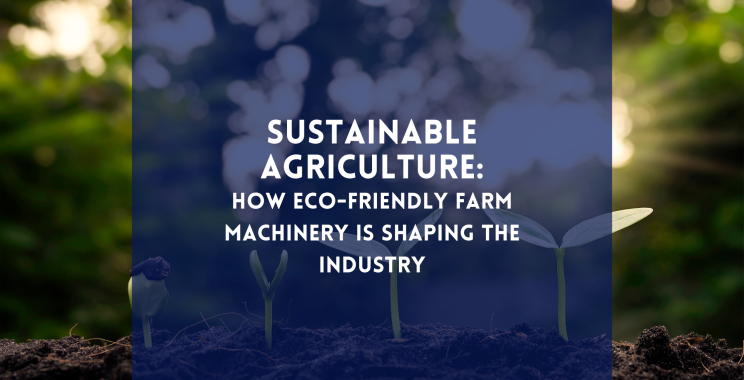Sustainable Agriculture: How Eco-Friendly Farm Machinery is Shaping the Industry
In an era of increasing environmental awareness and concern, sustainable agriculture has emerged as a critical priority for farmers and consumers alike. As the demand for responsibly produced food continues to grow, so too does the need for eco-friendly farming practices and machinery. In this blog post, we’ll explore how sustainable agriculture is being shaped by the adoption of eco-friendly machinery.
1. Reduced Environmental Footprint
Eco-friendly machinery is designed with sustainability in mind, incorporating features and technologies that minimize environmental impact. From electric and hybrid engines to alternative fuels such as biodiesel and ethanol, these machines help reduce greenhouse gas emissions and dependence on fossil fuels. By investing in eco-friendly farm machinery for sale, farmers can lower their carbon footprint and contribute to a cleaner, healthier planet.
2. Precision Agriculture Practices
Precision agriculture is a cornerstone of sustainable farming, allowing farmers to optimize resource use and minimize waste. Eco-friendly machinery plays a crucial role in this endeavour, enabling precise application of inputs such as water, fertilizers, and pesticides. Advanced technologies like GPS guidance systems and variable rate technology ensure that inputs are applied only where needed, reducing runoff and pollution while maximizing crop yields.
3. Soil Health and Conservation
Healthy soil is the foundation of sustainable agriculture, supporting plant growth, nutrient cycling, and water retention. Eco-friendly machinery promotes soil health and conservation through practices such as reduced tillage and cover cropping. By minimizing soil disturbance and erosion, these machines help preserve soil structure and fertility, ensuring long-term productivity and sustainability on the farm.
4. Energy Efficiency
Energy efficiency is another key aspect of eco-friendly farming machinery. From tractors and harvesters to irrigation pumps and storage facilities, these machines are designed to operate with maximum efficiency, minimizing energy consumption and costs. By investing in energy-efficient equipment, farmers can reduce their reliance on finite resources and lower their operating expenses, improving the overall sustainability of their operations.
5. Lifecycle Considerations
In addition to their operational impacts, eco-friendly machinery also takes into account their entire lifecycle, from production to disposal. Manufacturers of sustainable farm machinery prioritize materials that are recyclable, biodegradable, or sustainably sourced. They also design their products with durability and longevity in mind, reducing the need for frequent replacements and minimizing waste. By choosing farm machinery for sale with strong environmental credentials, farmers can minimize their ecological footprint throughout the equipment’s lifecycle.
In conclusion, eco-friendly machinery is playing an increasingly important role in shaping the future of sustainable agriculture. By promoting reduced environmental footprint, precision agriculture practices, soil health and conservation, energy efficiency, and lifecycle considerations, these machines help farmers operate more sustainably and responsibly. As the demand for sustainably produced food continues to grow, investing in eco-friendly farm machinery for sale becomes not only an environmental imperative but also a smart business decision for farmers looking to thrive in a rapidly changing world.
Tags: farm machinery, farming, farm tips

